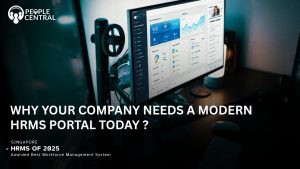Introduction
Let’s be honest, no one starts a business because they love filling out forms, chasing approvals, and getting buried in spreadsheets. But somewhere along the way, HR turns into this giant puzzle of onboarding, payroll, compliance, and employee management. It’s a lot.
This is where HR software comes in to overcome this headache, and honestly, now HR software has gone from being a luxury to something you really can’t do without.
It saves time, cuts down on errors, and actually lets you focus on people instead of drowning in admin.
In this blog, I will walk you through the must-know essentials before choosing an HR platform because picking the right one will seriously change the game for your people and your peace of mind.
What Is HR Software And Why Does It Matter?
HR software is basically your digital sidekick for all things people-related work. It helps you track who is working and who is off. It also helps you to take care of things like paying salaries, approving leave, hiring new people, and checking how well everyone is doing their job.
According to Gartner, by 2025, 60% of enterprise organisations will have adopted some form of HR technology, and that number is only going up, especially since COVID fast-tracked Digital everything.
Key Features To Look For
When you are checking out HR platforms, there are a few key things you definitely should make sure are included:
Centralised employee records: So you are not searching through papers or different files to find someone’s phone number or start date.
Automated payroll and statutory compliance: This one is a must so that you don’t mess up pay or miss things like CPF payments.
Time and attendance tracking: This will help you always know who is at work, who is on leave, and where people are working from.
Recruitment and onboarding workflows: So that bringing in new team members is smooth and fast.
Performance management modules: So, feedback and appraisals don’t turn into a last-minute rush.
Employee self-service (ESS) portals: Because it’s 2025, and people should be able to apply for leave or get their payslips without bugging HR.
Advanced analytics and HR dashboard: So that you can actually understand what’s happening with your team and not just see numbers in a spreadsheet.
Integration with accounting, ERP, and biometric systems: The fewer disconnected tools you have to manage, the better, so that you don’t have to jump between a bunch of tools to get work done.
If your HR software takes these boxes, you are already ahead of the game.
You know what’s interesting? According to Paychex’s 2019 Pulse of HR Survey, 87% of HR professionals said that HR technology has strengthened their contribution to corporate success. They help cut down a ton of admin work. Less paperwork, fewer repetitive tasks, what’s not to love?
Also Read: Exploring the Future: FWA 2025 Insights
Benefits Of Using HR Software
When companies start using good HR Tech, the benefits are pretty clear:
Efficiency Gains: Did you know that Deloitte found that businesses using modern HR platforms saved up to 30% on cost-per-hire, around a 50% reduction in time due to automated onboarding, and around 792 hours per role.
Fewer Errors: One of the best things about HR software? It helps you avoid mistakes because with automated software managing payroll, taxes, and leave tracking gets way easier.
Improved Retention: HR software can significantly enhance employee retention. It makes work feel more organised, fair, and easier for everyone, which makes people want to stick around.
And get this: Companies using people analytics tools actually saw 50% lower turnover compared to those sticking with the old methods.
So the bottom line is that a solid HR system does not just make things easier, it can seriously improve how your whole team runs
2025 Trends In HR Tech
If you are thinking about where HR tech is headed, it is all about being smart, flexible, and people-focused. You will want to keep an eye out for platforms that include:
Cloud-based access: So that updates are automatic and your HR team isn’t stuck at a desk. It is super handy if you have remote employees, too.
Mobile-first design: Because I think most people would rather tap through tasks on their phones than log into a clunky desktop portal.
AI-powered features: It is super important because think about resume scanning that actually makes sense, chatbots that answer basic questions, and analytics that help you make decisions faster.
Built-in engagement tools: Like quick service, real-time feedback, loops, or even fun little recognition, badges to keep morale up.
What To Consider Before Choosing HR Software
Before selecting any HR software, evaluate a few key things:
Your core needs: Knowing what you want from your HR software is always going to help. Think before you choose one and look for all the features you want from your HR software, like payroll, time tracking, hiring, onboarding, etc.
Ease of use and mobile accessibility: Another thing is that it should be simple and easy to use. If it is complicated and doesn’t work well on mobile, your team wouldn’t be able to use it efficiently.
Compliance with local laws and labour standards: You should also check if it plays well with local laws. Especially if you are hiring in different countries, you will want something that keeps you compliant without giving you a legal problem.
Integration with your finance or ERP tools: It should also connect with your existing tools. If you are already using finance or ERP software, integration is a must. You don’t want to be stuck, copying data between platforms.
Customisation and scalability: You should always check if the software is flexible and can handle more people and features because your team will grow and will not be the same size and set up in a year.
Vendor reliability and support quality: Also, check their support, quality, reviews, and how often they update the software. A shiny demo means nothing if you cannot get help when you need it.
1HR software that honestly checks all the right boxes? PeopleCentral. It is a cloud waste, all in one HR system built right out of Singapore, and it handles pretty much everything- leave, claims, payroll, appraisal- you name it.
What’s cool is that it is totally mobile-friendly, and it even uses facial recognition for attendance. It sings smoothly with tools like QuickBooks, Xero, and biometric systems, so there is no manual juggling.
And if you are running a business in Singapore or Malaysia, it’s even better. It is built to stay compliant with local requirements like CPF and IRAS, which means less worrying about whether you are taking all the right boxes or not, and more time for actually focusing on your team.
Why Does PeopleCentral Stand Out?
Let me tell you, PeopleCentral has really made a name for itself in the region, and it’s easy to see why.
Award-winning platform: First off, it’s not some generic HR tool; it actually won gold at the 2024 HR Vendors of the Year Awards in Singapore for best HR Tech for Gig Workforce Management. That is a pretty big deal.
Smart Technology: it has an AI assistant named ABBY who answers HR questions instantly. Plus, there is also an AI Signal Watch that keeps an eye out for anything odd in your HR data. It is super smart stuff.
Expense Automation: Submitting expenses with PeopleCentral is easy. Staff just need to snap a photo of a receipt, and the system’s OCR technology auto-fills the claim form.
The company has now integrated this feature with WhatsApp, and they are calling it Reme (Reimburse me). All you have to do is take a picture of the receipt and send it to Remi on WhatsApp. That’s it. The system picks it up from there, processes the claim, and once it’s reviewed, your reimbursement is on the way. How cool is that?
Big Brand Trust: It is not just SMEs using it. Big brands like DHL, Daiso Japan, Petron, and Bandai Namco are all onboard. In fact, over 100,000 employees across Singapore are already using PeopleCentral.
Government Support: Also, it is pre-approved under the Productivity Solutions Grant, so Singapore-based SMEs can get up to 70% of the cost subsidised.
Also Read: The Evolution of Taxation in Singapore 2025: A Historical Overview
Conclusion
So, picking HR software isn’t just about going digital for the sake of it. It is about actually making your life easier and your team’s work smoother. I mean, imagine not drowning in spreadsheets every month or chasing people for documents. Sounds amazing, right?
The right system takes care of all this stuff, so HR can focus on people, not paperwork, because when your HR runs smoothly, everything else just clicks better, and who doesn’t want that?








 5
5


























